If you look at the flowgraph posted by @Kevin Reid above, you can see that it takes the input data, subtracts 127, multiplies by 0.008, and converts pairs to complex.
What is missing is the exact types. It is in the GNU Radio FAQ. From there we learn that the uchar is an unsigned char (8 bits) and the complex data type is a 'complex64' in python.
If done in numpy, as an in-memory operation, it looks like this:
import numpy as np
import sys
(scriptName, inFileName, outFileName) = sys.argv;
ubytes = np.fromfile(inFileName, dtype='uint8', count=-1)
# we need an even number of bytes
# discard last byte if the count is odd
if len(ubytes)%2==1:
ubytes = ubytes[0:-1]
print "read "+str(len(ubytes))+" bytes from "+inFileName
# scale the unsigned byte data to become a float in the interval 0.0 to 1.0
ufloats = 0.008*(ubytes.astype(float)-127.0)
ufloats.shape = (len(ubytes)/2, 2)
# turn the pairs of floats into complex numbers, needed by gqrx and other gnuradio software
IQ_data = (ufloats[:,0]+1j*ufloats[:,1]).astype('complex64')
IQ_data.tofile(outFileName)
I've tested this translating from the rtl_sdr file format to the gqrx IQ sample input file format and it seems to work fine within what can fit in memory.
But beware this script only works with data where both input and output files can fit in memory. For input files larger than about 1/5 of system memory, which sdr recording can easily exceed, it would be better to read the bytes one at a time.
We can avoid memory-hogging by reading the data 1 byte at a time with a loop, as with the following program in gnu C. This isn't the cleanest code, I should probably add fclose and check ferror, but it works as-is for hobby purposes.
#include <complex.h>
#include <stdio.h>
#include <stdlib.h>
// rtlsdr-to-gqrx Copyright 2014 Paul Brewer KI6CQ
// License: CC BY-SA 3.0 or GNU GPL 3.0
// IQ file converter
// from rtl_sdr recording format -- interleaved unsigned char
// to gqrx/gnuradio .cfile playback format -- complex64
void main(int argc, char *argv[])
{
int byte1, byte2; // int -- not unsigned char -- see fgetc man page
float _Complex fc;
const size_t fc_size = sizeof(fc);
FILE *infile,*outfile;
const float scale = 1.0/128.0;
const char *infilename = argv[1];
const char *outfilename = argv[2];
if (argc<3){
printf("usage: rtlsdr-to-gqrx infile outfile\n");
exit(1);
}
// printf("in= %s out= %s \n", infilename, outfilename);
infile=fopen(infilename,"rb");
outfile=fopen(outfilename,"wb");
if ((infile==NULL) || (outfile==NULL)){
printf("Error opening files\n");
exit(1);
}
while ((byte1=fgetc(infile)) != EOF){
if ((byte2=fgetc(infile)) == EOF){
exit(0);
}
fc = scale*(byte1-127) + I*scale*(byte2-127);
fwrite(&fc,fc_size,1,outfile);
}
}
